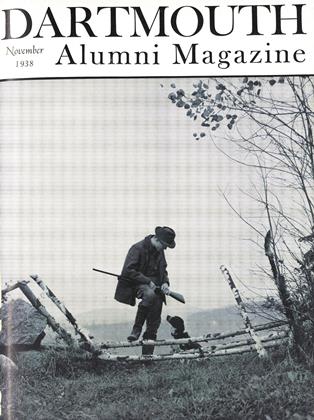This group's contribution to the solution of the problem was the suggestion of setting up an advisory committee consisting of representatives from the Administration, the Faculty, Palaeopitus, TheDartmouth, and the Alumni Adviser who will supervise the business side of the paper in the manner prescribed in the Report, and who will exercise editorial advice in conjunction with the Council. It was also suggested that "this Council meet weekly to discuss issues, problems of taste, and of operation. That these meetings be open to anyone having criticisms or suggestions; and that parties interested or involved in current issues be summoned to these meetings by invitation." Opposed, then, to the ownership and removal suggestions of the Committee which seem to them quite bureaucratic, this group instead proposed to accomplish the desired ends by tenure of a position which they called "Responsible Independence."
After having examined the problem as fairly and objectively as possible, based on various undergraduate viewpoints, these conclusions seem to have established themselves. First it would seem that the Committee on Publications meant what they said when they stated that "something less than absolute control should be experimented with." It is somewhat dubious that the Committee's stock-ownership and power-of-removal clauses were originally designed to tie any controversial editorial discussion hands and feet. It is quite doubtful that constant censure and editorial intervention were the objectives of the Committee. Rather, they saw in these measures ultimate safeguards against any future Regrettable Occurrence as a result of undergraduate bad judgment. But the opposing group saw ineffectiveness and danger in the extreme Committee proposals, and the controversy lay just as it had—no disagreement as to the ends the Report wanted to achieve, but plenty as to the method by which it wanted to achieve them.
Any fair decision, therefore, in an attempt to satisfy all parties would involve, consequently, a careful and fair evaluation of whether it was necessary to impose the Committee rulings in order to bring about the desired results.
The composite opinion of the faculty members and undergraduates with whom this writer talked was unfavorably disposed to the Committee's extreme proposals. If there was general agreement that The Dartmouth was guilty of and should overcome criticisms leveled against it, the consensus was it could be done without arbitrary authority from above. An advisory committee composed of representatives from the Administration, the Faculty, the Student Body, and The Dartmouthit was felt—could meet the problems of the paper in an efficient and comprehensive manner. This board, moreover, as contrasted to the non-resident Trustee, meeting once a week could decide on problems which might have become objectionable editorial or administrative errors between the long monthly intervals between Trustee visits. The Trustee, it has been divulged, might possibly spend much of his time closing doors after horses had been stolen. It is felt that the advisory board could discuss and reach fair and equitable decisions on such problems as financial setup, editorial policy, elections and staffs, group control, and so on. The editors of The Dartmouth, regarding the decisions of the Committee with much weight, would be held stiffly accountable to it for irregularities.
From a standpoint of the traditions of journalism, it is generally considered that The Dartmouth should retain its function as a free organ of student thought and opinion. It should be considered true, as some have pointed out, that President Hopkins' liberal policies should give those who stand for an uncontrolled student press no apprehension, since through him the probability of action by the Alumni Trustee, except under the most extreme circumstances, might be considered so small as to be non-existent. Some have even pointed out that the Alumni Trustee might be less restrictive than the suggested advisory board. Yet the belief of some, that the tolerance and moderation which there is reason to feel President Hopkins would expect of the Alumni Trustee might not continue through future Administrations, offers some threat at least. For it has been pointed out that there can be no guarantee of the ultimate limits to which the interference of the Trustee should fairly be confined.
In an attempt to evaluate the controversy fairly, it would seem to this writer then, that the purely practical aspects in favor of the representative Dartmouth Advisory Board in preference to the Alumni Trustee and his arbitrary powers are supplemented by the quite desirable, if ideological, tradition of a free college press.
As a matter of conciliation, it would seem that a trial at least of the advisory system, to bring about objectives both sides have agreed upon, would not be out of order.
 View Full Issue
View Full Issue
More From This Issue
-
 Class Notes
Class Notes1930*
November 1938 By ALBERT I. DICKERSON -
 Sports
SportsBig Green Teams
November 1938 By "Whitey" Fuller '37 -
 Article
ArticleGradus Ad Parnassum
November 1938 By The Editor -
 Article
ArticleDartmouth's Rebel Saint
November 1938 By ALLAN MACDONALD -
 Class Notes
Class Notes1917
November 1938 By EUGENE D. TOWLER -
 Class Notes
Class Notes1921*
November 1938 By CHARLES A. STICKNEY JR.
Ralph N. Hill '39
-
 Article
ArticleThe Undergraduate Chair
June 1938 By Ralph N. Hill '39 -
 Article
ArticleLARGE NUMBER WORKING WAY
June 1938 By Ralph N. Hill '39 -
 Article
ArticleELECTIONS IN FULL SWING
June 1938 By Ralph N. Hill '39 -
 Article
ArticleThe Undergraduate Chair
November 1938 By Ralph N. Hill '39 -
 Article
ArticleDIFFER AS TO MEANS
November 1938 By Ralph N. Hill '39 -
 Article
ArticleThe Undergraduate Chair
April 1939 By Ralph N. Hill '39
Article
-
 Article
ArticleGIFT BY REV. J. E.JOHNSON IN MEMORY OF MELVIN O. ADAMS '71
December 1920 -
 Article
ArticleReport of Special Committee
December 1924 -
 Article
ArticleTHE REPLY AND RESULT
JANUARY 1929 -
 Article
ArticleFather Sliney Leaves
August 1945 -
 Article
ArticleAN ALUMNUS ON THE OUTING TRAIL
April, 1923 By ALBION B. WILSON '95 -
 Article
ArticleThe Hanover Scene
November 1957 By BILL McCARTER '19

